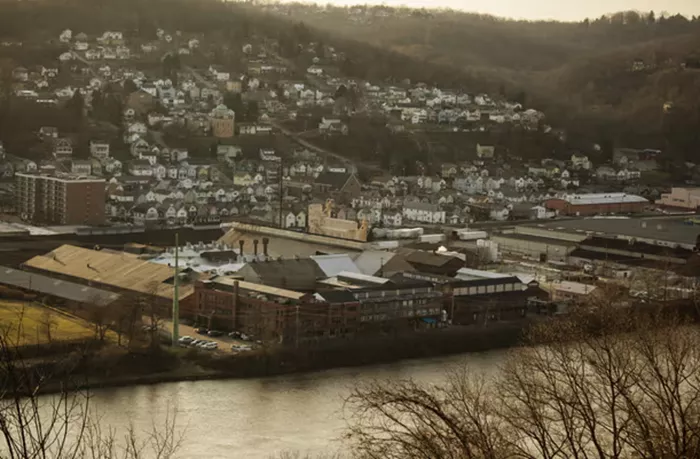Kristin Hopkins-Calcek, the president of Charleroi’s council, takes pride in one notable fact about her community: it is now one of the few boroughs in Pennsylvania experiencing population growth.
“We haven’t invested in our borough for a long time,” she says, “and now we are finally able to do that. It’s because we have a need to.”
Located in southwestern Pennsylvania, Charleroi was once a symbol of Rust Belt decline, surrounded by retired power plants, railway lines, and steel mills. For decades, the area witnessed factory closures and an exodus of residents, leading to a population decline of about 60%.
However, recent years have seen a surge of immigrants moving to Charleroi, drawn by well-paying jobs and affordable housing. According to the 2020 census, for the first time in a century, more people chose to settle in this quiet community along the Monongahela River instead of leaving.
Rodny Michel, a native of Port-au-Prince, Haiti, arrived in Charleroi four years ago. Initially, he worked in line jobs at a food preparation company and later at an Amazon factory nearby. Today, he is transforming an outdated store on Fallowfield Avenue into a Caribbean restaurant to serve the growing immigrant community.
“Sometimes I work for 12 hours a day,” Michel shares from inside Global Food Mart, a Caribbean grocery store where customers enjoy arcade games and browse through boxes of tropical fruits. “It will be the first for our community, and I’m proud of that.”
While local leaders like Michel and Hopkins-Calcek view Charleroi as revitalizing, others have attempted to leverage the town’s immigrant communities for political gain. This has brought Charleroi into the national spotlight during the contentious 2024 election cycle.
Last month, former President Donald Trump falsely claimed that Charleroi was “virtually bankrupt” and facing “massive crime” due to immigrants, aiming to make immigration a central theme of his campaign.
Similar to Springfield, Ohio—where Trump’s false claims led to bomb threats and neo-Nazi rallies—Charleroi has attracted right-wing YouTubers and KKK groups disseminating recruitment materials on local Facebook pages.
Some locals support Trump’s rhetoric. John Horner, who fixes watches part-time on Fallowfield Avenue, expressed skepticism about immigration, saying, “When Covid was here, people were losing their jobs, but these folks were allowed in [to America]. That tells me there was something going on there.”
Horner adds he has “mixed emotions” about accommodating those fleeing war and poverty in the U.S. “They open up their own stores and buy off their own people,” he explains. “A lot of them aren’t here because of war; they’re here because of connections—they heard from others [about Charleroi].”
Charleroi currently faces significant challenges. Reports have surfaced indicating that a staffing agency is hiring undocumented immigrants in the area and paying them in cash. Additionally, a local glass factory that employs about 300 workers is relocating 170 miles west to Ohio, which has sent shockwaves through the community. The town’s poverty rate stands at 25%, more than double the statewide average.
Trump’s influence appears to be growing locally, as more than 60% of voters in Washington County, which includes Charleroi, supported him in the 2020 election.
Nationally, immigration has emerged as a key campaign issue in recent months, despite a significant drop in encounters at the U.S.-Mexico border. In August, U.S. border patrol recorded only 58,038 encounters, a sharp decrease from the peak of 132,856 in May 2019. Just 46 of those encountered last August were Haitian nationals.
Studies indicate that Haitians and other immigrants on Temporary Protected Status (TPS) play crucial roles in the U.S. economy, particularly in essential sectors. According to an analysis by the Center for American Progress, over 131,000 TPS immigrants worked in vital occupations, including healthcare and food processing during the pandemic.
In response to the influx of immigrants, local leaders in Charleroi have acted swiftly. In 2022, a Neighborhood Partnership Program was established, funded in part by local businesses relying on immigrant labor, to provide services aimed at integrating immigrant communities.
Two years ago, the town created a community liaison officer position, now filled by a Haitian national, to assist immigrants with enrolling in English classes, registering children in schools, and setting up health-testing sites at the local library. The borough is home to a significant Haitian community, as well as over a thousand immigrants from Liberia, Jamaica, and other nations.
“Our business owners in town are overjoyed with the influx of foot traffic and the revitalization of our downtown,” Hopkins-Calcek notes. “It’s been a long time since there has been any investment in Charleroi.”
Michel, reflecting on his time in Charleroi, says he has not faced negative interactions and appreciates the local authorities’ efforts. “In Haiti, the government doesn’t take care of the people like they do here,” he observes.
Despite his concerns about border issues, Horner acknowledges that Haitian immigrants have positively impacted the town. “They come in here a lot looking for cheaper clothes and other stuff,” he states. “As a businessperson, [immigrants] are good for business. Capitalism is a good thing. I have no complaints.”
Related topics:
- Russia’s Conflicts: Immigration as a Tactical Tool
- Immigration Agency Seeks Assistance to Extradite Fraud Suspect
- Immigration Firm Owner Arrested for Cheating Man


